The gomen is raising the minimum wage next year. Does that mean our gaji will increase too?!
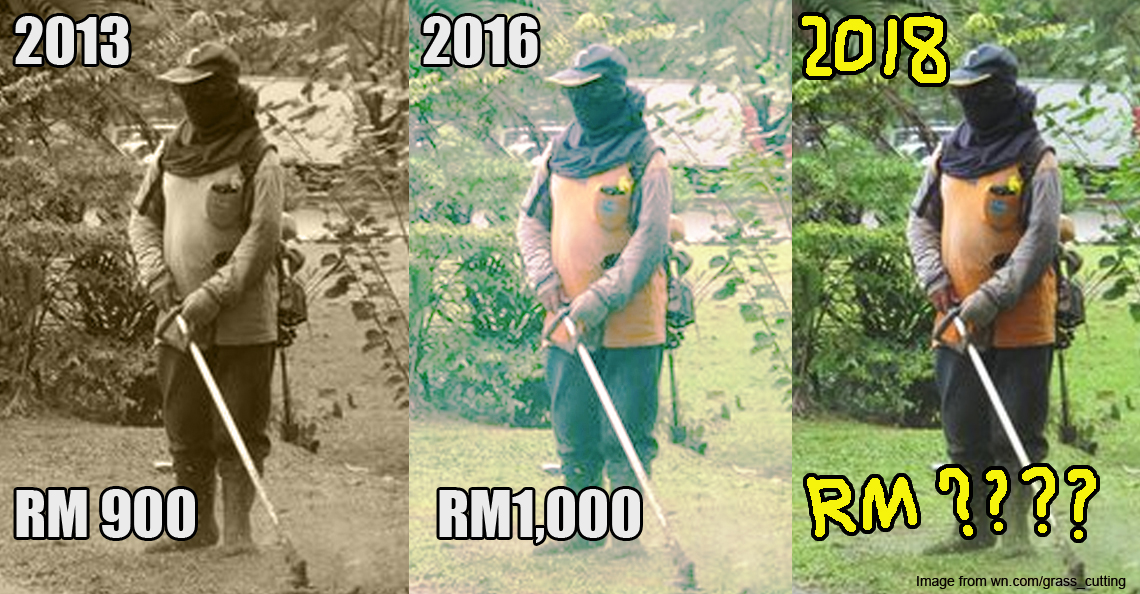
- 545Shares
- Facebook476
- Twitter9
- LinkedIn11
- Email17
- WhatsApp29
Most people have a love – hate relationship with work. On the one hand, its more healthy to find joy and accomplishment in something that occupies 5-6 days of your week. On the other, who could resist long weekends and surprise holidays whenever Malaysia wins something. But, its probably harder to love your job when you’re only expecting peanuts at the end of the month.
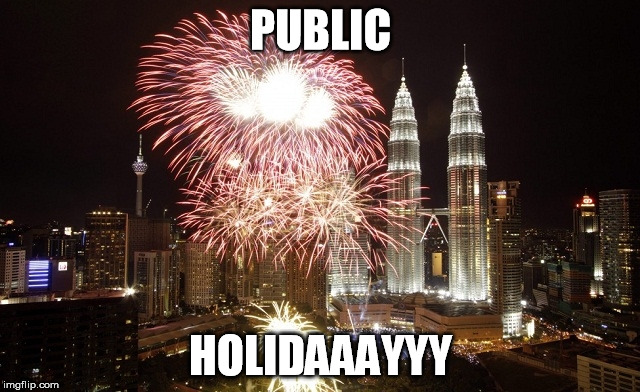
On 12th October 2017, the gomen announced that they are raising the minimum wage next year. However, Human Resources Minister Datuk Seri Dr Richard Riot Jaem did not say when or how much exactly the wage will be raised, so there’s not much to riot about. The minister also added that they have already started plans to determine the new minimum wage, in line with the country’s current socio-economic development.
“The review will take into consideration the cost of living as well as the operations cost which has to be borne by the employer who manages to close the gap in income in Malaysia.” – Human Resources Minister Datuk Seri Dr Richard Riot Jaem, quoted from Malay Mail Online
Hooray, more money for… everyone??? Come to think of it, why do we need a minimum wage in the first place? Will it affect the people earning higher than the minimum wage? Will it hurt businesses since they need to spend more money on paychecks? We try to solve these mysteries of the minimum wage, and also asked En. Nurhisham Hussein, General Manager of the Economics and Capital Markets Department of the Employees Provident Fund.
Malaysia introduced the minimum wage in 2012, but has only raised it once

The minimum wage was mentioned by PM Najib in the budget speech way back in 2010. Old news articles suggests that the announcement for the implementation and the rates was only 2012, while the actual implementation began in 2013. The starting minimum rate was RM900/month in Peninsular Malaysia (RM4.33 per hour), and RM800/month (RM3.85 per hour) in Sabah, Sarawak, and Labuan.
Then, in May of 2016, the gomen announced a raise to the minimum wage. Known as the Minimum Wages Order 2016 (MWO 2016), the wage was increased to RM1,000/month for Peninsular Malaysia (RM4.81 per hour), and RM920/month for Sabah, Sarawak and Labuan (RM4.42 per hour). Daily rates are based on a 48 hour work week, but subjected to the number of working days, so it varies from RM38.46 to RM57.69 a day in Peninsular, and from RM35.38 to RM53.08 a day in Sabah, Sarawak and Labuan.
So, why do we need the minimum wage? According to the National Wages Consultative Council of Malaysia, these are the 4 objectives:
- Ensuring the basic needs of workers are met
- Provide social protection workers
- Encourage the industry to move up the value chain by investing in higher technology and increase labour productivity
- Reduce the nation’s dependence on unskilled foreign labour
The first 2 are pretty straight forward because with a better pay, workers can afford a better quality of life, and since a minimum amount is guaranteed by law, there is pressure on employers to not cheat employees.

For objective number 4, higher wages are meant to encourage locals to take up local jobs, thus reducing the need to hire from abroad. As for number 3, higher wages is supposed to drive up productivity by making workers happier (hopefully), in effect also reduces the turnover rates of companies.
“We need to change the way we operate. We must couple talent with technology to increase our productivity. The days of pumping cheap labour into the economy to increase production are over – we have reached our limit.
I am confident that if we value our labour more by paying them a decent wage, then we will do more to ensure that they will earn their keep. And we will give them tools and training to do that.” – Former Minister Idris Jala, quoted from PEMANDU
Experts welcomed the minimum wage, but are VERY divided on the recent raise
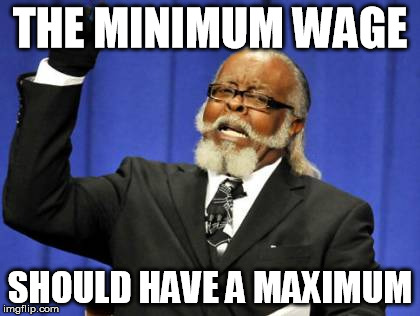
We didn’t find reports of anyone against the minimum wage, but the recently announced raise have sparked debates among experts and stakeholders on its impact and practicality. Of course, those who represent their respective persatuans spoke in favor of them. The Malaysian Trades Union Congress (MTUC) in May 2017, called for the wage to be raised to RM1500 in Peninsular and RM1000 elsewhere.
“We want a minimum wage which is fair to workers, businesses and the economy. We can’t simply place a figure which may end up discouraging economic activity. I believe the figure of RM1,500 follows the Selangor model of the minimum RM1,500 wage for public sector workers.” – Abdul Halim Mansor, President of MTUC, quoted from Free Malaysia Today
The Malaysian Employers’ Federation (MEF) on the other hand, warned that the move will backfire on employees.
“My main concern is, if the authorities force the issue (increasing starting salaries), the employers may react by reducing the number of their employees just to maintain their costs.” – Shamsuddin Bardan, executive director of MEF
But even the opinions of experts were equally mixed. The opinions against the raise ranged from forcing businesses to cut cost by firing workers, to employees being replaced by automation and machinery. Meanwhile, proponents said that the economy is expanding enough to absorb the hike in minimum wages, and the increase in productivity would balance out the extra cost employers would have to bear. So everyone seems to make sense, but they’re conflicting each other simultaneously… So how now?! Is it good or bad?

Technically, all that they said could be true, and all happen at the same time, and it all depends on how much the wage was raised. En. Nurhisham told us that as long as the minimum wage increase is on par with the overall wage increase, we shouldn’t see much negative effects.
Back in 2014, the U.S. experienced the same thing when their gomen wanted to raise the national minimum wage from USD7.25 to USD10.10. Predictions there were difficult because the situation in each state such as unemployment rates and industries were different. Some saw improvements, while some saw little change at all.
In 2016, the median salary was RM1703, while the average was RM2463 according to the Department of Statistics Malaysia. In the latest labour force statistics for 2017, Malaysia’s labour force was at 14.93 million, with low skilled workers making up of 13.2% of the work force (about 1.97 million people). We couldn’t find the exact number of workers earning minimum wage, but Pakatan Harapan estimates around 300,000 out of 14.96 million workers earned a minimum wage across all industries, including part-time employees.
But, does this affect me if I earn more than the minimum wage?
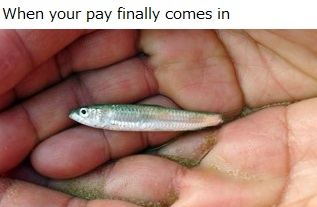
We assume most of you reading this are not poor enough to be dancing with joy for the raise, but also not rich enough to be worried because we not boss or taukehs. But there is the “ripple effect“, which says that an increase in minimum wage will also lead to a gradual increase throughout the entire salary “food chain”. Simply put: Everybody gets a raise!!1!
En. Nurhisham observed that when the minimum wage was first implemented in 2013, wages were raised not only at the bottom but also at the median level of wages.
“The July 2016 revision did not show the same effect, largely I think due to wages as a whole already growing faster than the minimum wage revision.” – En. Nurhisham Hussein told CILISOS
But, it comes with a catch. The ripple tends to get weaker and weaker as it travels further (or higher) up the hierachy. In a study that tracked the effects of minimum wage in the U.S. from 1979 to 2012, a 10% minimum wage increase saw between 2.9 to a “negligible increase” in other salaries. In fact, if you’re earning slightly higher than the minimum wage, but aren’t that difference skill-wise, you might even lose your job.

As for scares of rise in inflation and product prices, we can all rest easy because that has been pretty solidly dismissed.
In terms of social protection, there are better ways than raising the wages
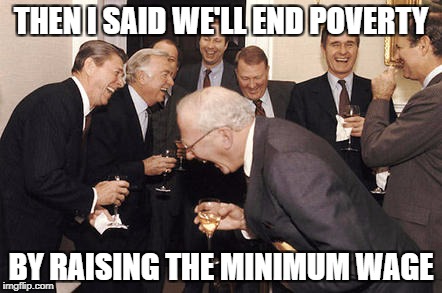
There are those who say that the minimum wage policy has been viewed too highly, and is being mistaken for some sort of magical cure to our problems. Carmelo Ferlito, a senior fellow at the Institute for Democracy and Economic Affairs (IDEAS) told Free Malaysia Today debates about the policy were “strictly political“.
“Even if we admit that minimum wage supporters’ hearts are in the right place, we have to recognise that they don’t see the relationship between skills and wages,” – Carmelo Ferlito, quoted from Free Malaysia today
Christopher Thornberg, founding partner of Beacon Economics was less polite when he commented on the fiasco in the U.S. when they raised the minimum wage.
“This is a political debate, not an economic debate. You’ve got two groups of poseurs out there, one on the right, one on the left, who claim to be doing real economic research. But the answers have been handed down to them by their donors. What you’re really getting fed is a big pile of crap from both sides of the fence.” – Christopher Thornberg, quoted from VICE NEWS
En. Nurhisham also points out that there’s a lot of give and take to negotiate a minimum wage raise, in terms of ease of enforcing and fairness of the law. For example, working in the Klang Valley is more expensive, thus the minimum wage there should be higher than in Sabah or Kelantan. But how should a multi-tiered minimum wage apply to a company that does business in KL, has a factory in Johore, but is headquartered in Seremban?
“The minimum wage provides a floor for wages, but won’t bring people out of poverty. It is only one tool out of many, but to fully address poverty and low incomes, we need the complete toolkit.” – En. Nurhisham told CILISOS
Though we’ll never know what the full effects of raising the wage will be now, but when it comes to the economy and poverty, we’ll have to be wary to not expect anything too drastic.
- 545Shares
- Facebook476
- Twitter9
- LinkedIn11
- Email17
- WhatsApp29



